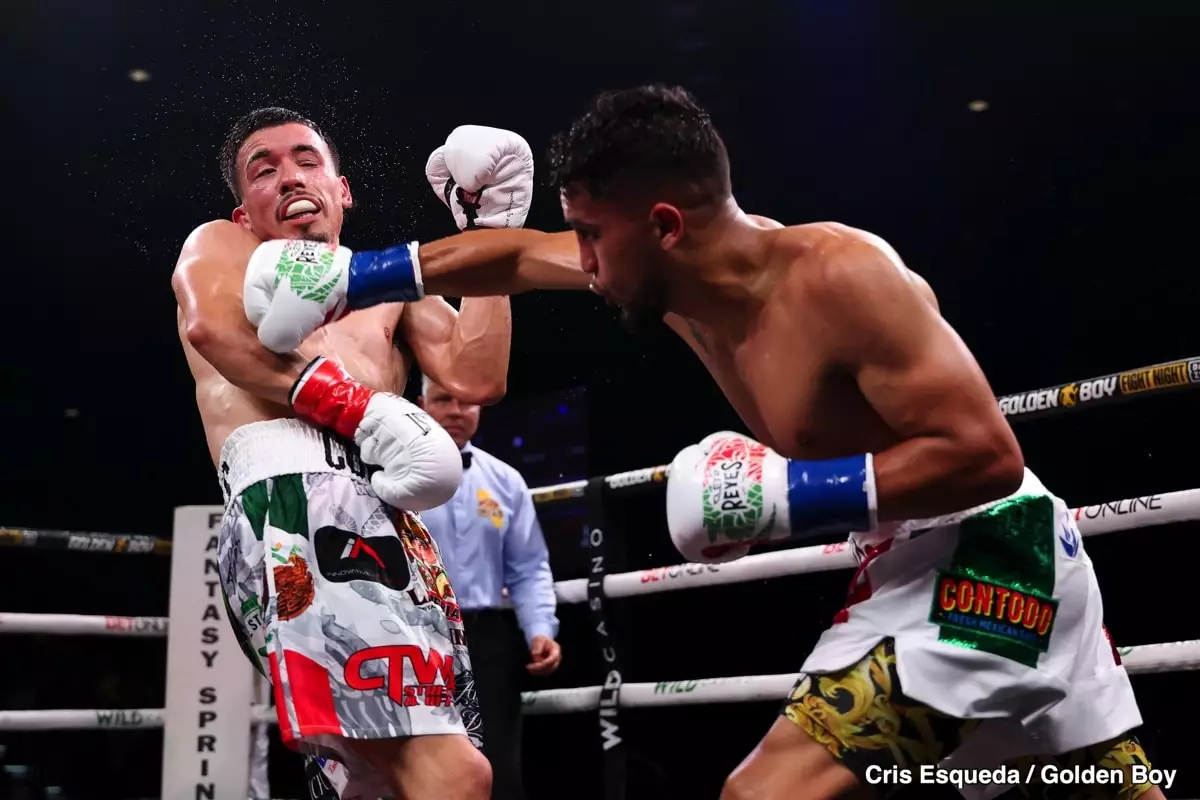Boxing—arguably the sport of gladiators—often thrives on visceral spectacle, raw emotion, and razor-thin margins. Yet, occasionally, it reveals its most unsettling flaws: inconsistent judging, political biases, or sheer indifference. The recent fight night at Fantasy Springs exemplified this chaos, where the clarity of victory was drowned in a sea of dubious scorecards. When judges awarded a majority draw in a fiercely contested super bantamweight bout, it didn’t just misrepresent the fighters’ efforts—it highlighted how disengaged some officials can appear, turning a sport of passion into a game of chance.
How can we accept a result that, on the surface, defies all logic? Jorge Chavez, visibly irked, questioned the legitimacy of the verdict—”What were the judges watching?” His frustration resonates deeply because it underscores a broader issue: the disconnect between fighter effort and official recognition. Chavez’s claim that his cut originated from a headbutt, coupled with his assertion that Flores lacks real power, suggests this fight was more about a tactical, defensive dance than a groundbreaking exchange. Yet, the judges’ cards—one 97-93 and two 95-95s—imply they saw a contest that might have been closer to a joke than a fair assessment.
This result exemplifies a crucial point: judging in boxing remains often subjective, heavily influenced by personal biases, or worse, lethargy. If fighters’ performances are almost universally regarded as intensely competitive, why are verdicts sometimes so detached from what spectators and fighters know to be true? The problem isn’t in the scoring criteria—they exist and are clear—but in their application. When judges seem disengaged, boxing’s reputation suffers, sowing seeds of distrust that threaten the sport’s integrity.
Fighting for Respect: The Underlying Battle Inside the Ring
While the main event was marred by confusion, the co-main showcased how fighters often must fight not just their opponents but also perceived biases. Farid Ngoga’s tactical boxing totally outshone the flashy, yet predictable, style of Jordan Panthen. Ngoga’s calm, calculated approach earned him a majority decision, proving that intelligence and patience can triumph over hype. The judges displayed a shared understanding of who controlled the fight—except for one card, which still declared it a draw. Such a discrepancy highlights how subjective perceptions influence outcomes, even when fighters display clear dominance.
Across the card, fighters demonstrated resilience and adaptability, even in the face of flawed decisions. Grant Flores’s swift second-round knockout of Todd Manuel was a brutal reminder that sometimes, talent and preparation win out decisively. Meanwhile, Cayden Griffiths continued his seamless ascent by dispatching David Ramirez in the fourth round, remaining undefeated with a perfect record (6-0, 6 KOs). These moments affirm that skill, in the right circumstances, can be uncontestable and undeniable—a sharp contrast to the chaos of the main event.
The night wasn’t just about victories but about asserting respect and demonstrating that fighters can deliver compelling performances regardless of officiating shortcomings. The wins by Leonardo “Bazooka” Sanchez and Fabian Guzman emphasized a crucial idea: consistency and dedication often overshadow controversy. Sanchez’s explosive knockout in the fourth round and Guzman’s unanimous decision under pressure showcased fighters focused on progress, not excuses.
Prelims and the Lasting Impact of Underwhelming Results
The prelim bouts, often overlooked, have their own stories—some featuring the wins of fighters eager for recognition, while others highlighted the stubborn persistence necessary for growth. Bryan Lua and Kevin Piedrahita’s draw underscored that not every fight needs a definitive winner. Their back-and-forth was emblematic of the sport’s essence—a relentless search for dominance, sometimes interrupted by indecision or fatigue.
Meanwhile, Javier Meza’s straightforward victory over Cesar Villarraga exemplified how clarity in scoring can affirm a fighter’s quality. With high scores from all judges, Meza’s performance felt like a breath of fresh air amid the night’s unpredictability. It was a reminder that sharp, disciplined boxing still commands respect and that sometimes, straightforward wins carry more weight than controversial conclusions.
What the night conclusively revealed is that boxing’s heart beats strongest when fighters refuse to let flawed judging diminish their efforts. Their resilience amid chaos reinforces the sport’s enduring appeal: that skill, heart, and strategy ultimately shine through even when the officiating falters. Yet, it also serves as a wake-up call: boxing must elevate its standards—particularly with judges—to protect its integrity and ensure that real talent isn’t buried under layers of indifference or bias.
What the Future Holds: Redemption or Repetition?
The question remains—will boxing learn from nights like this? The call for rematches is inevitable, but more fundamentally, there needs to be a reckoning with how judging is conducted. Transparent, accountable officials are essential to restoring trust. Fighters like Chavez and Flores—who gave everything in the ring—deserve fair evaluations, not dismissive strokes of a pen wielded by indifferent judges.
Judging reform isn’t just a matter of decorum; it’s a necessity for the sport’s survival. Boxing’s beauty lies in its unpredictability, its rawness, and its storytelling—none of which can genuinely flourish if decisions are regarded as arbitrary or unjust. Until then, nights like this will continue to be a mixed bag—spectacle and controversy intertwined, reminding everyone why boxing remains both beloved and flawed in equal measure.


Leave a Reply